投资者之家
美国人是如何投资理财的? - Millionaire in the making 如何成就百万富翁!
想当理财高手 - 2005-02-18, 21:40
发表主题: Millionaire in the making 如何成就百万富翁!
Millionaire in the making
When a high-flying job crashes and burns, it's good to have flight insurance.
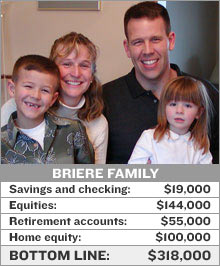
NEW YORK - Some people have the luxury of stable jobs. They can count on a steady income. But Jeff Briere knew he needed a fallback plan.
Briere began life in Holyoke, Massachusetts. His dad was a shift supervisor at Monsanto, while Mom stayed home to take care of Briere and his sister.
A 4.0 grade-point-average and leadership qualities (captain of the football and track teams, president of the Honors Society) won Briere a spot at the U.S. Air Force Academy.
He graduated in 1989. The Air Force assigned Briere to fly tankers, which refuel other jets in mid-air. "I wasn't overly thrilled initially, but I grew to love it," he says. At 23 years old, he was flying all over the world.
The military breaks down compensation into several components: basic pay; housing and allowances; and flight pay.
"I was advised that you can't count on flight pay," says Briere, "since if you ever lost your pilot qualification for medical or other reasons, you lose it."
During his early post-grad years, he says, other officers "always seemed to be talking about investing." He grew determined to live off the other components and invest the flight pay.
Gas jockey
By 1994, he had met and married Anna Wiars and the two were living at the Grand Forks Air Force Base in North Dakota. Briere was a captain and aircraft commander (and was getting his master's degree in aeronautical science) and Anna taught special needs children at the local school.
Briere transferred to the Air Force Academy to teach flying and the couple moved back to Colorado Springs. Their first home and son Jeffrey both arrived in June 1997.
The future looked rosy, but shortly afterward, the Air Force shut down the program after a flight instructor and student died in the program's third fatal crash in recent years.
That precipitated a life-changing decision. "I was nearing the end of my flying commitment to the Air Force and I wanted a more stable family life," says Briere. "The airlines were hiring in record numbers."
With little recent flying time on his resum? though, it was hard to land an airline job.
"A squadron mate had recently joined the Nebraska Air National Guard and invited me to take a look," says Briere. Joining the Guard would accomplish three objectives: completing his remaining Air Force commitment; getting some recent flying hours, which would make him more attractive to the airlines; and obtaining reliable part-time work.
The Guard was "a good insurance policy" says Briere.
Then, United Airlines hired him in March 2001. "I felt like I won the lottery," he says, but he had to put in a hard, unglamorous probationary year "I was paid about $30 an hour, but only for the hours actually flying, 70 to 75 a month," says Briere.
The family cut back. "If we couldn't eat it, we didn't buy it."
On his second year with United, Briere's pay went up to more than $100 an hour. Then, daughter Ashley was born on August 1, 2001. The Brieres contracted to buy a 4,000 square foot house on three acres in an exclusive neighborhood. Their closing date was September 15.
Second blow
September 11 hit the family hard. They backed out of the house deal. "I went on active duty orders," says Briere, "and lost my United income."
That was just a prelude. "People stopped flying," says Briere. The airlines didn't need pilots. Lay-offs ensued. United furloughed him in January 2003.
But the Guard -- Briere's flight insurance -- had a couple of full-time positions open up and he was hired for one in August of 2003. He moved the family to Lincoln, Nebraska.
Briere earned about $120,000 in 2004, including incentive and hostile fire pay. The family automatically deposits more than $1,240 every month into a Thrift Savings Plan. Another $400 a month goes into CGM Focus fund.
The rest of the Briere's portfolio is extremely diverse; they own tech stocks, such as Celsion, Sun Microsystems, and Vitesse Semiconductor, as well as shares of Southwest Airlines and Lucent. Index funds have performed well for the couple.
For retirement, the Brieres have three different accounts include an IRA and a Roth. All told, the Brieres have about $200,000 in savings and investments. They have no debt, other than a mortgage.
Military personnel save by shopping at the commissary and base exchange. The government provides health and dental care, and it subsidizes educational costs. Briere also uses base hobby shops to work on his car, make picture frames, and build furniture.
The Brieres also attend hockey games at the base, go ice-skating there, swim in the pool. "It's like a free health club," says Briere. They rarely eat out (Anna's a great cook) or go to movies, but they do take great family vacations to places like DisneyWorld, Seaworld, and Myrtle Beach.
Guard colleagues also pitch in and help each other with home projects, which saves thousands of dollars. One guardsman is a trained electrician, who wired Briere's basement.
Another guardsman pulled out a malfunctioning air conditioner and installed a new one. Briere returns the favors by doing woodworking for squadron-mates. 
想当理财高手 - 2005-03-09, 12:32
发表主题: 如何成就百万富翁
Millionaire in the making
Ken Tong knows the rules. That, however, hasn't stopped him from challenging a few.
Ken Tong likes to challenge conventional wisdom.
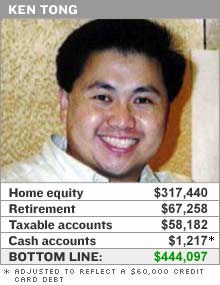
Carrying a high balance on a credit card, for instance, isn't normally a smart savings strategy. But with zero percent interest for one year, the 32-year-old scientist doesn't worry about taking out a $60,000 cash advance.
After all, he's not using it to buy frivolous items.
"It was so tempting to use that money and buy other things," he said. "It was very tempting to put it in a stock account or mutual fund, but that is so volatile."
Ken instead chose to invest the money in an interest-bearing savings account. It's a bold move, but a relatively safe one that will net a tidy $1,400 profit.
A mix of calculated risks, coupled with some traditional strategies, have buttressed the Thousand Oaks, Calif.-area resident's bottom line, now at $444,097. Ken wants to be financially independent within the next 10 years or so, and he has a few tricks that may help him get there.
Risky business?
Ken majored in science with a minor in economics at the University of California, San Diego. Clearly, he has the confidence to make non-traditional investing decisions.
One of his gutsier choices is not to maximize his 401(k) contributions. Ken limits his contribution to the company's match.
"Each person's financial situation is unique," he notes, adding that the only rule should be to max out on the company match. "That it is free money," he says.
He's not neglecting retirement, however. He recently started maxing his Roth IRA, because he prefers to invest after-tax dollars rather than pay those taxes later. In all, his retirement savings stands at $67,258.
Ken has other stock and mutual fund investments outside of his retirement accounts. His company offers an employee stock purchase program and he has a large stake in Janus' mid-cap value fund (Research) and global technology fund (Research).
His next big investment may be real estate. His parents emigrated from Hong Kong with a limited high school education, he says, but his mother, Sanny, ultimately steered the family away from their restaurant business to real estate.
Sanny is now retired, but he is hoping to tap her expertise in the San Diego market to buy an investment property there. Rising home values have boosted his home equity to $317,440.
Ken has a 15-year mortgage, with a 4.75 percent interest rate, on his own home, purchased in 2000. It's three-bedroom, and he's renting out the other two rooms, providing him with an extra $1,200 a month.
His company paid the closing costs as part of his relocation package, but his mom helped him with the 20 percent down payment.
"My mother had my sister and I pay for our own college," he stated. "But when it came to a house purchase, she helped out." (California residents do not pay tuition at in-state schools but they are responsible for fees, normally a few thousand a year.)
There's no shame in asking your family for help when you are starting out, he says, because if you are responsible you can use that assistance to build your own wealth. He's aware that not all parents can afford to assist their children, so he is especially grateful for the help he received.
Free to spend
Ken isn't an avid coupon clipper nor does he brown bag his lunch. That doesn't mean he isn't a saver; he socks a large part of the more than $60,000 he earns a year into stocks and mutual funds.
He bought his first car, a 2002 Subaru Forester, three years ago. The final sales price was only $800 above the invoice, but taxes and title drove it up to about $24,500. He took out a loan to cover the cost, but paid it off within a year-and-a-half.
"Any interest debt, I eliminated," he explains. "The only interest debt I have is my mortgage, and I am comfortable with that because the interest is tax-deductible."
He's also found a novel way to vacation cheaply. He has received a handful of free trips, including a cruise to Baja California, by attending time share presentations. No purchase necessary, although the sales pitches can be rather aggressive.
Ken claims to be a frugal guy, but that doesn't mean that he is cheap. According to his definition, cheap people are "tight with their money with other people and themselves."
"Because I save in all these other ways, it affords me a lifestyle I am really comfortable with," he notes.
Charles - 2005-03-27, 11:13
发表主题: 如何成就百万富翁
Millionaires in the making
Dave and Annie Hall keep everyday costs in check so they have more to spend on their passions.
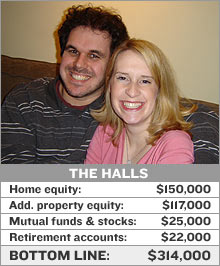 NEW YORK - Dave and Annie Hall have priorities: They want to build up their retirement accounts and other investments, live comfortably, and become millionaires over the next 15 years.
NEW YORK - Dave and Annie Hall have priorities: They want to build up their retirement accounts and other investments, live comfortably, and become millionaires over the next 15 years.
To accomplish these goals, budgeting is key. Dedicating dollars toward specific purposes helps keep the couple on a tight track.
"Building wealth," Dave says, "is not a matter of how much you make as how much you spend."
The 31-year-old social studies teacher and wife Annie, 27, a social worker, earn about $120,000 a year including an extra $40,000 Dave makes as an adjunct professor and teacher trainer.
They budget $300 a month for the supermarket. That includes groceries, paper products and cleaners, just about all their household goods. They also put in $60 a week each for what they loosely called "entertainment," which includes everything from dinners out to movies to lunch to haircuts.
They put more than $600 a month into retirement accounts, which Dave plans to bump that to $900 a month starting in April.
"We're quite careful about budgeting," he says. "I don't feel I'm living a millionaire's life, but I expect to be one in 12 or 14 years."
This April, a new little budget item will be making her debut ?Annie will give birth to a baby girl.
"We'll raise our supermarket budget to $500 a month, and an extra $15 a week for baby goods," says Dave. It means less coming in, with Annie staying home, at least temporarily.
That home is a nice three bedroom, two-and-a-half bath they bought for $155,000 in Warrington, Pennsylvania, four years ago. (It's now worth about $290,000.) They don't obsess about cars, owning a five-year-old Saturn and a 10-year-old Altima.
Globetrotting
By avoiding most luxuries, Hall figures the couple can spend discretionary funds on things they truly love. Like travel.
Dave started going places while in college. He took a "semester at sea," sailing around the world with stops in South America, Africa, and Asia. He was able to see some of those countries beyond the ports of call, always on the cheap.
"The least I ever spent for a hotel room was 20 or 30 cents in India," says Dave.
The trip implanted a wanderlust that Dave's never shaken. While completing his undergraduate work at Hampshire College, he visited Africa twice more and Asia once. Zimbabwe, Mozambique, Senegal, India, and Vietnam are just some of the countries he has seen.
How does Annie find the traveling conditions in Africa?
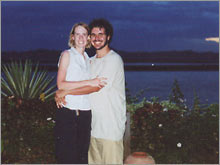 "In Mozambique, we had to go to a hotel, and she asked for a bucket of water to bathe," Dave remembers. "When the water went down the drain, several cockroaches came out of it. Now, we've bumped up what we spend on accommodations."
"In Mozambique, we had to go to a hotel, and she asked for a bucket of water to bathe," Dave remembers. "When the water went down the drain, several cockroaches came out of it. Now, we've bumped up what we spend on accommodations."
Still, "There's something valuable about learning that you can get by with less," says Dave.
That lesson crystalized in Malawi, where Dave met a young, very poor, African man and his mother. "I gave him a pair of broken sandals I had. These sandals were trash to me but they were the greatest footwear he ever had. His mother thanked me with tears in her eyes."
Dave doesn't mind splurging on things he considers worthwhile. A few years ago he ran a losing race for the Pennsylvania State House of Representatives, on a platform of HMO reform, school improvement, and protecting open space.
Satisfying though the exercise was, it did mean taking a financial hit in lost work time and expenses (about $10,000) to do it.
Roots
Temperamentally, Dave has always been frugal, but what really got him thinking about finances was reading "The MIllionaire Next Door," which describes the habits of some Americans who built wealth on limited income.
Shortly afterward, a colleague instructed him on some of the benefits of real estate investing. He shifted gears out of equities to properties.
A year ago, the Halls went in with Annie's parents on a beach-front condo in Ocean City, Maryland, they bought for $400,000. Similar ones now sell for $550,000 to $580,000. In February, they bought a rowhouse in nearby Norristown for $58,000.
They rent out the beach condo for the summer months and spend some weekends there. Rents from the rowhouse net them about $250 a month in cash flow.
All told, Dave figures the couple has about $260,000 in equity in their three places. He'd like to buy an additional income property each year.
They also own mutual funds worth about $12,000 and stocks worth about $13,000. Their retirement accounts combine for another $22,000. Other than loans on the properties, they carry no debt.
All told, they have more than $300,000 new worth, a good start toward their million-dollar goal.
They may make it on their timetable, but they don't figure to sacrifice their passions to achieve it.
"I want my daughter to see the world by the time she's 10," says Dave.
Charles - 2005-03-27, 21:28
发表主题: Millionaires in the making 如何成就百万富翁
Millionaires in the making
Ryan and Danielle Quilling are two twenty-somethings with a solid long-term plan.
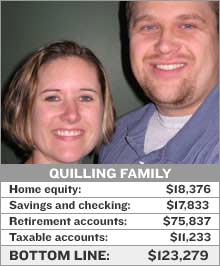 NEW YORK - Ryan and Danielle Quilling are hoping to be the millionaires next door.
NEW YORK - Ryan and Danielle Quilling are hoping to be the millionaires next door.
The pair could afford to trade in his 1997 Ford Ranger and her 1996 Saturn for newer models. Their two-bedroom home in middle-class Blaine, Minn., is also nice, but there are ritzier homes nearby.
It's not that living well isn't a priority. Financial independence simply ranks higher than status. Much higher.
"My biggest financial pet peeve is when people try to buy status," Danielle, 25, said. "They buy the fancy cars, the name brand clothing. Just overexerting what they can afford."
Not so for Ryan, 27, and Danielle. They prefer to plan their weekly menu around the Sunday circular, clip coupons, and tailor their buying habits to fit the sales. It's hardly a typical twenty-something lifestyle, but one they hope will pay off with an early retirement.
"As a younger person, I don't have money on my side, but I have time and that is more important," said Ryan.
Start now
Money was something Ryan didn't have, or couldn't hold on to, during his first few years at Minnesota State University, Mankato. He worked full-time as a manager at Wal-Mart during the summer. But reading Thomas Stanley and William D. Danko's, "The Millionaire Next Door," sparked a new interest.
"I just jumped into any financial magazines or publications out there," he said. "Constantly looking to improve or get new ideas."
Coincidentally, Ryan also met the former Danielle Dahlin during the summer of 1998 at Wal-Mart as she was working there while on a college break.
Danielle, now a telecom consultant, learned about personal finance growing up in a "budget conscious" environment. Her mother held a part-time retail job while her father ran a small business.
Ryan's mother is an accountant, and he says that he picked up a little bit of advice from her. But "The Millionaire Next Door" changed his thinking.
"That set me on this course," he said. "Really hammered home the point that it's not what you make, but what you do with what you make."
One of the Quillings' strategies is to save most of what make by setting aside 31 percent of their $108,000 a year earnings for savings and investing, on top of the 20 percent they each contribute to their 401(k) accounts.
Ryan, a sales supervisor at a financial services firm, does most of the research. He has access to Morningstar.com's professional site through his job and "scours that thing each month" to check fund ratings.
He dabbled in stocks in order to "turbo-charge" his retirement accounts, but called the move a gamble that backfired. Among his holdings: Fidelity's Equity-Income II Fund (Research), Longleaf Partners' Fund (Research), and Morgan Stanley's Institutional International Equity Portfolio (down $0.06 to $21.65, Research).
Managing debt and spending wisely
Neither Ryan nor Danielle have any credit card debt, but they are still paying off their student loans.
Ryan graduated in 2001, owing some $21,000 for his education. Since then, he has knocked that down to $14,000. He says that the return he is generating on other investments exceeds the interest on his loans.
Danielle graduated from Colorado College the same year with approximately $11,000 in debt. She's since managed to trim that down to $4,000.
Their biggest liability, however, is their mortgage. They opted for a traditional 30-year loan, but a summer 2003 refinancing lowered their interest rates from 6.875 percent to 5.375 percent.
Living below their means is relatively easy, Ryan says, because neither likes to shop. When they do, they hunt for bargains.
"I am very conscious of price and doing price comparisons," Danielle said. "I design all my shopping trips around what is on sale."
Need clothes? Danielle does her shopping at the end-of-the-season, through the Internet, or at a discount store such as Target or Old Navy.
Entertaining costs are easy to contain, too. They eat out once a week -- their Wednesday night dates -- and normally choose a restaurant based on the coupons found in the entertainment book and gold cards local high school athletes sell to raise funds.
Ryan says that Danielle is a bit more of a saver and it is easy to see why as her practicality also extends to gift-giving.
"Even when we are exchanging Christmas gifts or something, I'll get mad if he buys something I don't need or can't use," she explained. "I'm one of those people, if the blender broke, and he bought a new one, I wouldn't get mad -- that is, if he bought it on sale."
Charles - 2005-03-30, 11:48
发表主题: Millionaires in the making 如何成就百万富翁
Tycoon in the making
Bo Apostolache likes real estate investing so much, he's starting his own club.
L. A. - These days, investing in Southern California real estate is no walk in the park. "Overheated jungle" is more like it.
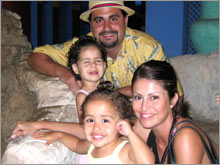 That hasn't keep people like Bo Apostolache, a 28-year-old mortgage banker in Orange County, out of the market.
That hasn't keep people like Bo Apostolache, a 28-year-old mortgage banker in Orange County, out of the market.
A few years ago, Bo and his wife Ana decided that she would become a stay-at-home mom to their twin 3-year-old daughters Alina and Jordyn. They realized they would need extra earnings to offset her loss of salary.
Given his profession, Bo chose to expand his focus on real estate. Instead of just helping other people finance their purchases, he wanted to start making deals of his own, as well.
For advice, he turned to a local investment club. But the first meeting proved less than illuminating.
"It was too technical. I'm a mortgage banker and even the mortgage information was hard to understand," says Bo. "It was not the general information that you need."
Attending the meeting did, however, put him together with others who were doing just what he wanted to do. That was enough encouragement to push an on-the-fence investor over the top.
"A lot of people like me don't have the knowledge ?and courage ?to start their own investments," says Bo. The club showed him that he could overcome inexperience.
Diving in
His first real estate purchase took place in 1999 when he bought the family home, a three-bedroom, two-bath in Santa Margarita. His father, Gabriel, sold it to him.
Dad, a Romanian immigrant who works in the computer business, gave Bo a great deal on the property, selling it for the $200,000 he himself had paid. An appraiser pegged its recent worth at more than $650,000.
Orange County prices have nearly tripled over the past five years. Last year, the median home price in the Anaheim-Santa Ana area rose 19.1 percent to $627,500.
It takes some guts to take the plunge into such a market, though. Apostolache says his purchase of an investment property in Orange City for $374,900 last December, "led to some sleepless nights."
It got worse after he took possession. The previous owner, a contractor, left the duplex condo in A-1 condition, and a week after Bo bought it, an appraiser pegged its value at $400,000.
Bo made some improvements, like a marble fireplace, plantation shutters, and Pergo flooring, then put it on the rental market.
He even inked a lease, at $1,850 a month, before disaster struck.
"My next-door neighbor called and said, 'I have some bad news: Your apartment is ruined,'" Bo remembers. A flood left five inches of water on the first floor, the ceiling caved in, and everything ruined. "They had to gut the ceiling to the 4-by-6 beams."
It cost more than $20,000 to repair and Bo had no insurance, so the loss was paid for out-of-pocket. He now has to sell the condo. Fortunately, real estate values have continued to climb and he has it listed for $400,000, which should be enough to cover most of his loss.
No throwing in the towel
Apostolache inherited a good dose of fighting spirit from his family. It was difficult for them to secure permission to leave Romania. Bo says his mother, Eugenia, had to go on a hunger strike to persuade authorities to let them go.
That spirit, plus an MBA, has left Apostolache with an itch for his own business. After his less than perfect investment-club experience, he thought he could do better by starting his own investment club, which he has christened the Orange County Investor.
He put a link on a Web site that listed investment clubs and got about 80 responses. That was enough to have him plan the kick-off meeting, which he hopes will attract about 500 people.
"We'll talk about real estate trends, the rental market, mortgage rates," he says. "For keynote speakers we'll have real estate agents, certified financial planners, mortgage bankers, but there won't be anything too technical."
He's planning to address the potential real estate bubble at the first meeting. He busy arranging sponsors ?he has a couple lined up already ?creating ads, and building a Web site at www.ocinvestor.com.
Bo's spending quite a bit to get the club off the ground. He expects to get some of that back in referrals for his mortgage lending and perhaps from attendance revenue as the club becomes a monthly staple for local investors.
His target audience is the higher-than-average income household and he hopes to expand the club's scope beyond real estate in future meetings. It's all his party, but a mentor is providing him some free advice.
It all sounds like a big undertaking, but Apostolache has energy and enterprise. He also plans other property purchases.
"Entrepreneurship is in my blood," he says.
passing - 2005-03-30, 12:03
发表主题:
这么多事例,不知道什么时候我也能成功
Charles - 2005-03-30, 12:03
发表主题: Millionaires in the making 如何成就百万富翁
Tycoon in the making
Former Coast Guard officer finds you can go home again -- and make money buying homes.
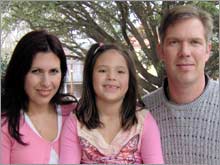 Dallas - Contrary to what another North Carolinian wrote, you can go home again. At least Jim Elliott did.
Dallas - Contrary to what another North Carolinian wrote, you can go home again. At least Jim Elliott did.
After years traveling as a Coast Guard flyer, Jim Elliott moved back to his hometown of Elizabeth City, N.C., to a life made a little more interesting ?and lucrative ?by real estate investing.
Elliott had already started, albeit slowly, well before he moved back home.
He bought his first house in 1995, paying $135,000, for himself and new wife Cindy on the northwestern coast of Puerto Rico, where she hails from and where he was stationed at the time. It commanded a sea view and came with swimming pool.
Three weeks later, Elliott went into a meeting with four other pilots where they were told the Guard had eliminated one of their jobs.
"They looked around the room, saw me, and said, 'you're leaving,'" says Elliott. The Coast Guard transferring him to Hawaii.
After heading west, he and Cindy tried to turn the Puerto Rico house into a vacation rental property ?a mistake.
"You cannot manage a property from 6,000 miles away," Elliott says. "The rent only covered half the mortgage and we only got that one out of every two months, on average."
He gave up on it after two years, selling it for about what he paid.
Look homeward
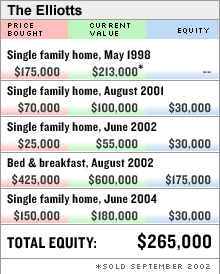 By the late 1990s, the Elliotts began looking to move back to North Carolina. A friend in the real estate business there pointed Elliott to a 2,500 square foot, four bedroom, 2-and-a-half bath, contemporary.
By the late 1990s, the Elliotts began looking to move back to North Carolina. A friend in the real estate business there pointed Elliott to a 2,500 square foot, four bedroom, 2-and-a-half bath, contemporary.
The house was a VA foreclosure. At first, Elliott thought it was too expensive, but the VA dropped the price every two weeks by $4,000 or $5,000.
After more than four months, it had fallen to $175,000, and Elliott pulled the trigger.
He transferred to a nearby Coast Guard base in 1998. The family, including daughter Jasmine, now seven, lived in the house until its sale, for $213,000, in September 2002.
Meanwhile, there were other deals. The VA had another foreclosure that Elliott bought for $70,000, with $500 down. He rented it out for two years, breaking even after figuring mortgage, taxes, and expenses, and sold it last summer for $101,000, realizing a net profit of about $25,000.
The next deal involved a neighbor of his grandmother. He bought the house, "mostly to be able to control who moved in next to her," for just $25,000. He also got his father involved.
"He was complaining that the bank was paying a half-a-point interest on his savings." Elliott remembers. "I said, 'why don't you lend me the money for this house.' It's a win-win."
Elliott got a no-money-down mortgage at a competitive rate and his father gets a big boost over the return the bank was paying him. He recently had it appraised for $55,000.
Elliott also bought a house a bit further out in the country, paying $150,000 for 2,000 square feet, a two-car garage, and a greenhouse.
Making it a business
 In September of 2002, the Elliotts took their biggest real-estate step, a $425,000 purchase of the Culpepper Inn, a 12-bedroom, 13-bath, brick colonial, bed and breakfast. They now live in several of the rooms and run the rest as an inn.
In September of 2002, the Elliotts took their biggest real-estate step, a $425,000 purchase of the Culpepper Inn, a 12-bedroom, 13-bath, brick colonial, bed and breakfast. They now live in several of the rooms and run the rest as an inn.
Some rooms rent on a monthly basis for about $700. The guests often come from one of several military bases in the area. In the summer, the Elliotts rent out as many as nine rooms, nightly, to vacationers for between $85 and $135 a night.
Elliott figures their net from all the properties at about $30,000 annually, a nice piece of change considering that they haven't had to invest very much up front.
The Elliotts spread their investment risk. They have a total of nearly $300,000 invested in IRAs, Roths, 401(k)s, stocks, and mutual funds.
Not that Elliott is worried about his real estate investments. Since this area of North Carolina has not had a big price run-up, a severe drop seems unlikely. Plus, he believes he bought well enough that even if markets decline, income from rents can tide them over until conditions reverse.
Long range, Elliott wants to expand his lodging business. A local businessman has been trying to develop a 6,000-acre plot of land outside of Elizabeth City for three years. If that goes through, Elliott plans to be a part of it, building a 60-to-80-unit hotel.
Not only can you go home again, but you can have lots of places to sleep when you get there.
想当理财高手 - 2005-05-14, 23:36
发表主题: Millionaires in the making 如何成就百万富翁
Working class heroes
Discipline and hard work are fast putting Mark and Lori Gorney in the millionaires club.
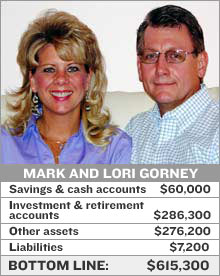 Dallas - Mark and Lori Gorney are well on their way to the millionaire's club, and they're not real estate flippers or lottery winners.
Dallas - Mark and Lori Gorney are well on their way to the millionaire's club, and they're not real estate flippers or lottery winners.
The autoworker and the sales associate have hammered out a financial success story that looks a lot like the American dream.
"You have to make rules and plan ahead," said Lori, 42, who works part time in a jewelry store in Saginaw, Michigan, the small city the Gorneys call home.
Over the course of a 20-year marriage, their discipline and planning have allowed them to put two sons through college, rack up a net worth of more than $600,000 on an annual combined income of $115,000 and plan on an early retirement.
Bank on rainy days
A lifetime job at a corporation like General Motors was once considered a surefire way to financial security. But in a post-Enron age more of the nation's workers feel this is no longer the case.
Mark Gorney, however, has made a longtime career at the automaker and feels fairly positive that seniority and a great work record will keep him at the job.
Moreover, a willingness to accept uncertainty as a fact of life has put the couple on financially sound footing.
"Mark always worked overtime when it was offered to him, but we always lived on his 40-hour-a-week salary," said Lori.
"You never know what can happen and you never know if jobs will always be there," added Mark, 52.
The couple used overtime pay as an opportunity to put away extra cash for emergencies and rainy days. And over the long-term the couple has socked away about $290,000 in retirement savings.
The Gorneys' primary savings strategy is to build equity in their home and to save 10 percent of their gross income in their GM retirement personal savings plan.
All of this is being done with the goal to retire within the next three to six years. To make early retirement possible they are also in the process of building a sizeable cash reserve to bridge the years until their personal savings plan and IRAs are accessible.
"We also keep about $6,000 in cash as a cushion for emergencies," Mark said.
Their main investments are mutual funds, with a proportionally small share in GM stock, the company where Mark works as a skilled laborer in the power train division.
Little things mean a lot
The Gorneys' tremendous sense of fiscal responsibility ensures that every cent helps.
Based on experiences during his previous marriage, Mark, 52, established that he needed to manage his finances well and keep track of his spending.
In his new marriage, the couple said they never had a problem agreeing on financial goals and had similar attitudes toward money management.
"We set a $50 rule. If one of us wanted to spend more than $50, we had to check with the other person," said Lori.
"While things have changed and the rule is $100, it's still the same thing," she added. "We don't impulse buy because you have to wait to tell the other person about what you want and decide together. It makes a system of checks and balances."
In addition, the couple gives themselves weekly allowances and keeps track of that cash.
"If you don't know where it goes, it can slip away," said Mark.
The couple has amassed a lot of small ways to save and eliminate hidden expenses that add up, like never paying bills late and getting hit with subsequent fees and never carrying a credit card balance.
They are also careful to do their financial detective work, and do not carry interest that isn't tax deductible.
Lori, who works about 19 to 29 hours a week at a jewelry store, has the time to do a lot of the planning that helps she and her husband save. She makes meals at home, packs lunches, makes trips to the bank to avoid ATM fees and stays on the lookout for hidden charges.
While their fiscal discipline may seem strict to some, it has afforded them the ability to help put Mark's two sons from his previous marriage through college, buy a great home and have the financial freedom and security to enjoy their lives.
想当理财高手 - 2005-05-14, 23:46
发表主题: Millionaires in the making 如何成就百万富翁
Millionaires, by the book
Florida couple shows there's room for advanced degrees, travel and saving 30 percent of your income.
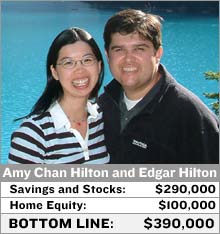 Florida - At some point either during or shortly after getting an undergraduate degree, many people ask the grad school question. Do I continue to pursue my academic dreams or enter the world of work?
Florida - At some point either during or shortly after getting an undergraduate degree, many people ask the grad school question. Do I continue to pursue my academic dreams or enter the world of work?
Often creature comfort trappings prevail, and hitting the books takes a back seat to paying the bills and saving for the future.
But Amy Chan Hilton and Edgar Hilton didn't make that bargain.
After graduating from MIT, where the couple met while doing a summer internship, they continued on to earn Master's degrees and, for Amy, a doctorate in engineering from the University of Virginia. Edgar's doctorate in engineering is coming soon.
They were lucky enough to get paid to go to grad school, but still needed to survive on a combined stipend of $2,500 a month. They not only survived, but continued socking away whatever they could into IRA accounts, a habit formed years earlier.
Now the highly educated couple have been in the work force for five years and can command an ample $140,000 combined income in Tallahassee, Fla., where 32-year old Amy is a professor of environmental engineering at Florida State University and 33 year-old Edgar is a manufacturing consultant.
The mechanics
Having laid a nice little base from their college years, the couple now invest pretty much by the book, setting aside 20 to 30 percent of their income in mostly large cap mutual funds through various retirement plans.
"In a happy world, we'd like to leave our 9 to 5 jobs by the time we reach 40," said Edgar. "We don't want to be working our entire lives. We want to enjoy things; family, friends, each other."
To help them get there, Amy relies on a 403 (b) retirement plan, similar to a 401 (k) but for non-profits. Her university contributes 10 percent of her weekly salary while she manages to kick in another 20 percent or so, or $350 a week. She also maxes out her Roth IRA, contributing the full $4000 a year and keeps about $3,000 to $5,000 in a cash account.
Edgar takes advantage of the SEP IRA plan for self employed people, to which he has contributed the full $12,000 a year for the last five years. He maxes out his Roth IRA as well and has some $20,000 cash on hand, which they may invest in real estate in the near future.
In addition, the couple bought a 4 bedroom, 2 bathroom brick house five years ago for $184,000, using some $10,000 in savings they had from graduate school and before as a down payment. They made $20,000 in mortgage payments and have seen its value almost double. They also have a small rental property in the area that generates some $3,000 in profits a year.
Although there are plans for children someday, they currently have very little in the way of student loans thanks to scholarships and no credit card debt.
The result is savings totaling almost $300,000 and another $100,000 in home equity.
Tradeoffs
Maintaining a 30 percent savings rate requires some sacrifices. They said they employ such tactics as cutting coupons, going to the early showing of movies and buying things only on sale.
They've also resisted temptation. When the Cooper Mini came out, Edgar says both he and Amy were dying to trade in their secondhand BMW 5-series and Subaru Outback for a sexy convertible or sporty hardtop.
"We're both car lovers and we really wanted those," said Edgar. "But we're going to hang on to ours until they fall apart."
But it's not as though the couple has no fun. Amy said they go out to eat four or five times a week and take at least one big vacation a year, last year to Banff National Park in the Canadian Rockies.
"We try to prioritize our money," said Amy. "But it's not like we're miserly."
So what happens if and when the 9 to 5 comes to an end? Edgar said he'd like to continue consulting but on a part time basis, while Amy says the university may provide a flexible work schedule.
They would also like to continue to travel.
"This is such a beautiful country, it would be a shame to spend your whole life working and not be able to enjoy it," said Edgar, who was born in Mexico and lived there until he was eight. "Road trips are definitely going to be somewhere in there."
想当理财高手 - 2005-06-01, 14:00
发表主题: Millionaire in the making 如何成就百万富翁!
Average earners can be millionaires too
Hai Tieu, a 35-year old teacher, has turned $60,000 a year into roughly half a million.
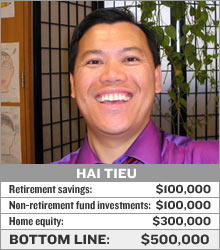 L.A. - For all of you who'd like to see a "Millionaire in the Making" about someone who isn't either flipping real estate or pulling down six figures a year, meet Hai Tieu.
L.A. - For all of you who'd like to see a "Millionaire in the Making" about someone who isn't either flipping real estate or pulling down six figures a year, meet Hai Tieu.
Tieu is a 35-year old 6th grade English and history teacher in Los Angeles making $60,000 a year. Through a combination of hard work, family, financial smarts and discipline he's now worth roughly half a million dollars.
Tieu is originally from Vietnam. His family was one of the "boat people" who fled the country after becoming disillusioned with communism.
He was eight years old at the time, living on an island off the coast of South Vietnam. After the communists took over his father, a jeweler by trade, was sent to a "reeducation camp."
"It was just brainwashing people into thinking communist ways were the best ways," said Tieu. "But we were feeling we didn't have the opportunities" there.
So his family and another combined their life savings to buy a 35-foot wooden fishing vessel, which they sailed around Cambodia and up the gulf of Thailand to Bangkok. Eight months later they were granted refugee status by the U.S. government and flew to L.A.
Tieu won a several scholarships that allowed him to graduate from California State University Los Angeles, where he became interested in education after having a work-study job in a day care center, debt free.
Following his graduation in 1993 Tieu went to work for the L.A. school system, where he's been ever since.
Yet Tieu didn't let his newfound job and regular paycheck tempt him into getting his own place in the city.
Instead, he stayed at home with his folks, paying just $300 a month in rent and socking the rest away in various mutual fund investments.
By 1997, on the cusp of the real estate explosion, he had saved enough to put down $37,000 on a $182,000 three-bedroom house in a planned development just east of Pasadena, about 30 minutes from where he teaches.
Eight years later Tieu carries a $116,000 mortgage balance on the house, which he says is now worth almost $450,000.
Shortly after closing on his home Tieu's brother moved in, paying $400 a month in rent, which certainly helped offset the cost of the $1,000-a-month mortgage and freed up more cash for fund investments.
Over the last decade or so Tieu has been diligent about setting aside a good chunk of his paycheck into index funds, splitting them between non-retirement index funds and index funds in a 403b retirement plan.
"I prefer them because they are immediately diversified," he said of the index funds, also noting that he spreads his funds around between large cap, mid cap, small cap, European funds and real estate trusts.
He's also attracted to the index funds because they charge very little in the way of fees.
When he first started investing he was paying one-and-a-half percent a year to a broker.
"That was way too much," he said. "I thought this person was looking out for me. But it turned out this person was just a sales person."
So he educated himself with various investing books and cut out on his own.
When his brother shared the house with him Tieu said he put most of his money into non-retirement funds, which now total some $100,000.
But now he lives by himself and puts most of his investment money into his 403b, some $1,400 a month, and that retirement fund now totals almost $100,000 as well.
He also picks up some extra cash by teaching summer school, and uses some of it to help put another $5,000 a year into his non-retirement accounts.
He says he could get another roommate if he wanted to save even more money, but doesn't believe the trade off would be worth it.
"I like the privacy," he said. "I like going home and just having a nice quiet place."
Tieu said with the help of his teacher's pension, which should pay about $1,500 a month if he stays with the job, he'll be able to retire by age 55.
He's also looking to diversify his investments outside of index funds. He mentioned getting into individual stocks but isn't exactly sure.
"I'm definitely not going into real estate," he said. "I don't think now is the time to buy with the inflated prices."
想当理财高手 - 2005-06-29, 21:28
发表主题: Millionaire in the making 如何成就百万富翁!
Rags to riches
With a do-it-yourself attitude, Denise Vincent is well on her way to becoming a millionaire.
Dallas - Denise Vincent is proof that you don't need a pricey education to be worth six figures. You don't need to be born with a silver spoon in your mouth either.
Like the "street smart" participants who blew away their "book smart" competitors on last season's "The Apprentice," Vincent doesn't have a college degree. But that hasn't stopped the financial assistant from amassing a net worth of about $325,000.
Self-reliance and a knack for getting the most out of each dollar underpin the financial success story of this 34-year old, who is getting closer to joining the millionaire's club every day.
Debt free is stress free
There wasn't a lot of money around when Vincent was growing up, and saving comes easily because she doesn't feel the need to live beyond her means. "I just don't have those impulses," she said. "If I know I don't need it, I will pass on it."
Watching members of her family file for bankruptcy turned her off buying on credit, and she has avoided the pitfalls of personal debt by adhering to a cash-only policy.
"I don't like to be in debt. I don't want to have to work to live. I would rather live to work," said Vincent, who keeps a credit card for emergency situations only.
Growing up, her family relied on government support, and that left a lasting impression on the way she handles her finances.
"That was a tough and embarrassing time and that's why my sister and I are goal-oriented," she said. "We don't like getting handed things."
Through careful financial planning, she expects to take an early retirement and in that aim, she contributes about $250 to $300 a month in her company's 401(k) plan, for which her employer offers a 6 percent match. She already has stashed away a nest egg worth about $35,000, mainly invested in blue chip stock funds.
A major element of her financial strategy is building equity in the 3-bedroom, 2-bath Sacramento home she bought with her now ex-husband in 1995 for $131,000. Only her name is listed on the title now, and she has about $121,000 left to pay on that property, which her realtor estimates would fetch $380,000 if sold today.
She also has stashed away $30,500 in personal savings, which she keeps divided between low-risk CDs and money market accounts.
"I want to have a million by the time I'm 45, or more of course," Vincent said. "But the only way I can achieve that is by either finding a higher paying, more challenging job or changing my investment portfolio. I am currently not where I should be, salary-wise."
Since she's wary of the volatility of stocks and tends to favor safe haven investments, Vincent is counting on the payoff of another asset she continually invests in: herself.
She has been taking classes online in pursuit of a bachelor's degree, and she's managed to do it for free by taking advantage of a company perk that offers tuition reimbursement of up to $8,000 each year, which covers all her school costs.
"I am always on the lookout for a better-paying, more challenging job with plenty of opportunity to advance," she said, and that free college ride means she won't have any loans to repay and better salary prospects on the horizon.
After she finishes her bachelor's next year, she intends to pursue a Master's degree -- also on the company's dime.
Value for money
"I try to save as much as I can, but I don't deprive myself of what I want or need," Vincent said, when describing her spending habits.
For instance, last year she bought a new 2004 Mini Cooper for $24,000 that she'd had her eye on. "I love it. It's so fun, I'll see other Mini owners and we'll all wave at each other. It's like a little family."
But even though she paid full price for her prized possession, she made sure she got the most mileage out of each dollar. The price of her Mini included an extended warranty, which will help her save on repair and maintenance costs, and insurance for the car was lower than for the BMW she had contemplated buying.
That value-for-money rule applies to purchases big and small. Her gym membership comes to $35 a month, but Vincent works out every day to get the full use out of it.
A do-it-yourself mentality also helps keep her expenses down. For instance, she prefers to mow and landscape her lawn herself, which saves her about $75 a month.
"I don't believe in paying outrageous amounts to have someone do something I can do on my own," Vincent said.
She's banking that self-reliance will help her achieve her goals in the long term. She's been sidetracked from her financial goals once before, when she got married when she was 23. "My ex-husband was very irresponsible when it came to money. I'm the one who put all the money down on the house when we got married."
But she's been back on course ever since she got divorced nearly eight years ago, and if she remarries, she plans on finding someone who is financially stable.
"People with lots of debt are unattractive to me," she said. "I don't want to lose everything I have worked hard for."
想当理财高手 - 2005-07-25, 13:43
发表主题: Millionaire in the making 如何成就百万富翁!
A millionaire's state of mind
Mike Rogalski says 'paying yourself first' and discipline are essential to becoming a millionaire.
 NEW YORK - It's a simple savings philosophy, but Mike Rogalski hopes that discipline and "paying yourself first" will put him at millionaire status by the time he reaches his early 40s.
NEW YORK - It's a simple savings philosophy, but Mike Rogalski hopes that discipline and "paying yourself first" will put him at millionaire status by the time he reaches his early 40s.
If his plan is fail-safe, his assets should reach $2 million by the time he is ready to retire.
"I'm estimating about 55 to 57 and if I could beat it I would," says Rogalski. "I'd be pretty happy to walk away with that."
Thirty-two years old, unmarried and without children, Rogalski currently works as a civil engineer in the U.S. Department of Defense in Jacksonville, FL where he earns $84,500 a year.
With $105,000 socked away in his government thrift savings plan, $25,000 divvied up between his checking, savings and a certificate of deposit accounts, another $33,000 invested in stocks and a variety of mutual funds, a lucrative pension and a recently purchased home valued at $245,000, Rogalski is a millionaire in the making.
Zen and the art of saving
The concept of "paying yourself first," says Rogalski, is a simple one: putting money into one of his many savings vehicles so he is forced to live below his means. He estimates that every two weeks, he pours $400 into his savings account, $450 into his mutual funds and approximately $450 into his government Thrift Savings Plan.
He says he doesn't miss this money since it is automatically withdrawn from his paycheck or checking account every month. Transferring funds electronically also makes the savings process easier since he doesn't have to worry about forgetting to write a check every month.
Being disciplined, he explains, does not mean a lack of a social life or denying himself every shopping urge. At the same time, he says that even when he got a raise, he didn't feel that it was necessary to up his lifestyle. Put simply, he just tries to keep his spending habits within reason.
"I go out, visit with friends, but I don't think I shortchange myself," he says. "I just live within the budget I give myself."
Sticking with what works
On the cusp of graduating from New Jersey Institute of Technology in Newark in 1995, Rogalski began working for the government. He spent the first eight years of his career living in New York City, before heading south to Florida. During that time, he juggled work and school before completing his masters in business administration from Pace University.
One year later he was off to Florida with his girlfriend, Christine, who he credits with supporting the decision to risk relocation.
From that experience, Rogalski realized that traditional investing methods are still the most effective means of planning for his future. At the same time, business school provided him with an awareness that he needed to strike a balance between his long-term goals and short-term flexibility.
"That was definitely a big help for me in terms of personal finance, that's for sure," he notes.
As a general rule, he keeps $25,000 in his checking and savings accounts and a nine-month certificate of deposit. He says those funds are allocated for emergency savings.
"In case something happens, I can pull it out at any time," says Rogalski.
He also opted to forgo opening up an IRA, or individual retirement account, for mutual funds instead. Again, he says, the motivation was flexibility. Right now, Mike has five mutual funds, each with a particular focus ranging from healthcare, to international small cap, to equity income to capital appreciation.
"It gives me exposure all around and keeps me pretty balanced," he says.
At the same time, Rogalski maintains his perspective on his long term goals. He maxes out his contribution to his government thrift savings plan at 15 percent, he purchases blue-chip stock every month from General Electric and JP Morgan Chase through their DRIP or dividend reinvestment plan, hoping that they will pay off down the road and he is expecting he will get a healthy pension if he stays with the Department of Defense until he retires.
Assuming he received no more raises and retired at the government's minimum retirement age of 57, his pension alone would provide him with $29,575 a year.
Spotting deals
While it may not be a communicated element of his wealth-building strategy, knowing how to spot a deal seems to be essential for Rogalski's wealth-building strategy.
From saving a few bucks by buying stock directly from the company instead of through a broker to figuring out the best time to purchase a new car, Rogalski tries to exploit any advantage he can get.
Rogalski's home, his largest asset, is a perfect example. A little over a year ago, he plunked down $190,000 for a brand new four-bedroom, three bathroom home in St. Augustine, FL, which is located approximately 40 miles southeast of downtown Jacksonville. The only other occupant of his home, which is 10 miles from the beach, is his girlfriend.
What made this particular house so lucrative was the fact that it was on inventory, which meant that the builder needed to get rid of the property. Mike knew he was in a better position to negotiate. As a result, he estimates he got it for 10 to 15 percent below market value.
In addition, since he opted to finance the home with the builder, he did not have to pay closing costs.
Rogalski's only other major source of debt, his 2005 Acura TL, he purchased at the end of the month when he knew the dealer needed to get rid of some of his inventory.
While timing and negotiating is critical, Rogalski points out that there is a balance between saving a dollar and quality. Sometimes it is worth it to pay a little extra for something that will last.
"The best value is not so much the cheapest thing," he says. "Get something that you like that maybe has the feature you want and try to work a good deal with financing and pay it off quickly rather than get something cheap or you can't afford."
Reaching the goal
While Rogalski's current savings plan puts millionaire status well within reach, he admits that his saving abilities are helped by the fact that Florida does not have a state income tax and that the cost of living may be slightly cheaper in St. Augustine than other parts of the country, such as New Jersey where he grew up.
Even though these perks may raise an eyebrow about the legitimacy of his savings plan, he knows he can silence critics who believe he is basing his wealth on the value of his recently purchased home.
"With the plan I have I can see that without the real estate," says Rogalski, on potential investment in real estate. "At the rate I'm saving, I would hope to accumulate enough money and have little debt that I'd be able to live a pretty comfortable life."
想当理财高手 - 2005-07-28, 10:04
发表主题: Millionaire in the making 如何成就百万富翁!
Millionaires by choice
Mark and Kristi Johnson say you can do things you love and still save through sensible spending.
 NEW YORK - They've traveled to Budapest and Prague and have one future college education paid for, but that has not deterred Mark and Kristi Johnson from shooting for millionaire status.
NEW YORK - They've traveled to Budapest and Prague and have one future college education paid for, but that has not deterred Mark and Kristi Johnson from shooting for millionaire status.
Both employed with International Paper Company in Selma, Ala., the couple says that the key to saving has been spending money wisely.
"We're not to the point that we're depriving ourselves," said Kristi. "What we do is spend money on what really matters to us."
With $281,000 deposited in retirement accounts, $138,000 in stocks and mutual funds, over $80,000 in their checking and savings accounts, a home valued at $283,000 and an annual combined income of $170,000, the Johnsons are well on their way to becoming millionaires.
Starting out
Mark, 32, a mechanical engineer and Kristi, 31, a financial analyst, both began their careers with International Paper after being recruited by the company right out of college.
Originally hailing from Connecticut, Mark graduated from Virginia Tech with his bachelor of science in engineering degree in 1994 and Kristi, an Alabama native, earned a full-ride to Tulane, where she got her bachelor's degree in finance in 1995.
Meeting at work, Mark and Kristi both furthered their education as they both attended Auburn University executive MBA program at night, in Montgomery, Ala. with International Paper footing the bill. Right around the time they graduated with their masters in 1997, the couple began their courtship.
Two years later they were married. But the couple already had a jump on their financial future. Both previously owned homes and both enrolled in their company 401(k) plans shortly after they started with the company.
Shortly after tying the knot, the couple ramped up their savings by maxing out their 401(k)s and opening individual Roth IRAs four years ago. With their employer matching a portion of their contributions to their 401(k), Mark and Kristi have socked away $281,000 between their individual 401(k) and Roth IRA accounts.
They also note that the low cost of living in the region has helped them amass a sizeable savings by their early 30s.
Living in a small town just outside of Montgomery, Ala., the Johnsons are not saddled with high income or property taxes. Their current home, which they bought two years ago, has five bedrooms and three bathrooms -- and it only cost them $267,000.
"We realize how fortunate we are to live down here," said Mark.
Picking and choosing
While the only debt the Johnsons carry is their mortgage, they are not willing to attribute their sizeable nest egg solely to free education, cheap real estate and low Alabama taxes.
It has taken some serious belt-tightening for them to put away that kind of money and still be able to travel around the globe to such far-flung places as the Caribbean and Russia.
From small stuff to big ticket items, Mark and Kristi have tried to save any way they can.
Right now, Mark and Kristi try to live off of the smaller of their two paychecks.
When they put their last home on the market, they sold it themselves, which saved them realtor's fees, which typically range between six and eight percent of a home's selling price.
With nationwide gasoline prices averaging $2.28 a gallon as recently as Tuesday according to AAA, the Johnsons drive to work together even though they have two cars and Kristi starts 45 minutes later than Mark. They estimate that they save $6 a day in gas on their 45-minute commute.
They even wait for a movie to come out on DVD and order water at a restaurant in order to save a few hundreds of dollars a year.
"You may not realize getting iced tea or coke at dinner adds up to several hundred dollars a year," said Mark. "It's the little things."
Building a future
By trimming excess spending from their budget, Mark and Kristi have also been able to diversify their savings, buying stock as well as creating several mutual funds.
While their interest in stock purchases has waned, they still have $25,000 in such stock as Southwest Airlines and Office Max . For them, blue chips equities and growth stocks were the most appealing to them.
Mark and Kristi also make the saving process painless by having $1,800 deducted from their bank account every month and funneled into one of their four mutual funds. Right now, the balance on their two mid- to large-cap funds, their real estate fund and bond fund are valued at $113,000.
But their investment in mutual funds, according to the Johnsons, is earmarked for one thing -- college tuition. Tuition that will pay for at least one child to go to his or her school of choice.
While they don't have any kids yet, the couple hopes to have two children at some point in the near future.
"We wanted to get a college education for at least one child before we started a family," said Kristi. "That's one of our goals -- to be able to provide college for our children without loans or having to work crazy jobs."
If their own financial plans come off without a hitch, Mark and Kristi estimate they will be able reach millionaire status by the time they are 40, travel to New Zealand and China and retire early if possible.
"Those are our goals," said Kristi. "That's why we save like we do and spend like we do."
Charles - 2005-09-29, 08:25
发表主题: Number of millionaires hits record
Number of millionaires hits record
There are 8.9 million affluent households, and the number of 'emerging affluent' grow, study finds.
NEW YORK - There are 700,000 more millionaire households this year than in 2004, according to a survey released Wednesday.
Households with a net worth of at least $1 million excluding primary residences rose 8 percent to a record high 8.9 million, according to an annual report by TNS Financial Services, a market research and polling firm.
This is the third consecutive annual increase, although this year's growth rate is far more modest than the 33 percent increase seen in 2004.
Interestingly, although the number of millionaire households grew, the averages among some of their primary investments were down.
TNS found that there were fewer millionaire households who owned investment real estate this year than last, although real estate continued to be a staple in investment portfolios for many.
And while the number of millionaire households owning individual stocks and bonds went up, the average balance in their investment portfolios went down. Likewise, those owning mutual funds also saw their account balances decline from an average of $355,000 last year to $283,000 this year.
On the plus side from a net worth perspective, these households' overall debt fell, by 8 percent, from an average of $179,000 last year to $165,000.
"There usually is never one thing that drives the (number of millionaires) up or down," said Jeanette Luhr, manager of the TNS research study. But, she noted, the millionaire households didn't grow rich overnight.
"The growth we've seen this year is largely due to measured planning and active reinvestment," Luhr said in a statement. "When asked about their investment approach over the past year, 61 percent of millionaires said their approach has changed very little, indicating they have a strategy and they are sticking to it."
That includes maintaining and monitoring a diversified portfolio, Luhr said, and also taking advantage of low interest rates to refinance and pay down debt.
The survey did not look at what tax changes millionaire households may have taken advantage of.
The total income reported among millionaire households averaged $119,000. Among those households that drew some of their income from jobs, they earned an average of $82,000 in salaries or professional fees. The average age among the heads of these households was 56, and about 75 percent of them said they felt confident they will be financially prepared for retirement.
More millionaires on the way?
The TNS study also found that the number of "emerging affluent" households is also on the rise.
TNS defines "emerging affluent" as households with a net worth between $100,000 and $500,000, excluding primary residences.
This year, they number 24.5 million, up from 23.9 million in 2004.
"More and more we are seeing financial institutions offer planning services designed specifically for the emerging market. As these households continue to take advantage of these tools, we're seeing their numbers increase," Luhr said.
The average age of the emerging affluent is 49.6, and the average total income reported is $64,600. Among those households that drew some of their income from jobs, they earned an average of $45,000 from salaries or professional fees.
Retirement confidence among these households is high: 69 percent said they felt they will be prepared for retirement.
想当理财高手 - 2005-12-21, 10:44
发表主题: Millionaire in the making 如何成就百万富翁!
Web sales wizardry
Internet business allows 24-year-old Justin D'Angelo to maximize personal time -- and profits.
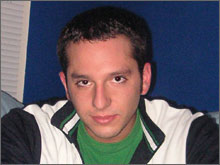 Dallas,TX - Justin D'Angelo didn't want to go straight to a 9-to-5 lifestyle after college, so he needed to launch his own business. But he didn't have any idea what that business would look like.
Dallas,TX - Justin D'Angelo didn't want to go straight to a 9-to-5 lifestyle after college, so he needed to launch his own business. But he didn't have any idea what that business would look like.
Getting a modest start in his freshman year selling various products on eBay, he found that one offering in particular was really taking off: Soft polyurethane-based chairs that look like the bean bag chairs of yore.
"In the beginning, I would sell information CDs, diet pills -- a lot of different things. It progressed into selling the Poof Chairs," says D'Angelo. "The site really blew up once I started using pay-per-click advertising and learning more about getting high-ranked results in search engines."
Now that D'Angelo is firmly established as the proprietor of PoofChairs.com in Raleigh, North Carolina, he says he's bringing in $150,000 in annual profits with few costs and a minimum of office work. Meanwhile his business continues to see steady growth.
D'Angelo began at North Carolina State University with an engineering focus, but soon switched to business management with a concentration in marketing, graduating in December 2003.
"I found that I really liked the marketing end of business," he said. "I was teaching myself everything I needed to get the site more exposure."
D'Angelo got an early start with computers, thanks in part to his father.
"I'm a huge computer geek, but you wouldn't know it from meeting me," he said. "My dad taught me Excel, but I learned most things -- like Web design -- on my own."
He got involved in a range of online activities -- eBay, PayPal and online stock trading -- when they were in their infancy.
But his goal was to make $100,000 a year. "Without working 9 to 5, I knew I had to do something to get ahead as quickly as possible," he said.
Thanks to his diligent marketing and unique niche, D'Angelo is having his way.
"PoofChairs.com has doubled in sales and profit every year since 2002. It's grown to be a $150,000 business this year, and I expect it to be bigger next year," he said. "It's a product that spreads by word of mouth -- people see them in homes and want to know more."
And none of this is coming at the expense of his personal life.
"Thanks to drop shipping, I basically don't have to touch the product," he said. Customers place the order on his Web site, and he then orders the product from a manufacturer in Michigan and has it shipped directly to his customer. "People don't believe me when I tell them, but I spend about an hour a day working -- mostly responding to e-mail."
D'Angelo has always exercised an accountant's caution with his finances. For a long time, he tracked every purchase he made on a Microsoft Excel spreadsheet, reducing budget categories where necessary.
"I wouldn't go out to eat dinner with my friends," he said. "I used to be extremely frugal."
Now that his income from PoofChairs.com is a comfortable $150,000 annually, he is a little less rigorous in documenting individual purchases, but his budget is still tightly organized.
He has a car loan and a mortgage on a condominium which take up 40 percent of his $4000 monthly budget.
He spends $800 on groceries, $500 on entertainment, $180 on insurance and $120 for energy bills.
He keeps some money in an interest-bearing PayPal account, and invests $5000 a month in the stock market. He is not shy about investing on margin, amplifying his market returns.
"I like to put most of my money in a somewhat safe account, but I also invest in companies whose products I use, like eBay, Google, XM Satellite Radio and Yahoo," he said. "My goal is to get my monthly savings to $10,000."
With his current assets and a plan to put away $5000 each month, assuming his investments grow at an annual stock market average of 9 percent, he will be a millionaire by age 34.
Living in an apartment near the North Carolina State campus, D'Angelo lamented that he was throwing so much income at rent when he could be building home equity.
He purchased a 3-story, 3-bedroom condominium not far from his old apartment, knowing that if he eventually moves elsewhere, it will be a potential rental property for college students.
He pays $960 a month for his mortgage, and currently has equity of $11,500 in the condo.
D'Angelo has no shortage of plans for the future.
"I am starting a second Web site -- build-a-bedroom.com -- that I want to build into the same size as Poof Chairs," he said. "I am hoping to have two six-figure businesses going. And I'm always looking for new business ventures."
With self-taught entrepreneurial skills and a cohesive vision for his finances, D'Angelo is a model of meeting personal financial goals.
Charles - 2005-12-28, 15:02
发表主题: Cash only please
Cash only please
Christopher Ortega and Alicia McDonald have shaken their debt by buying only what they can afford.
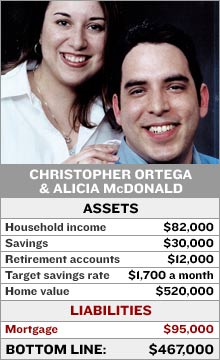 NEW YORK - At the end of the evening, when it's time to settle the check or close the bar tab and most people reach for the plastic, Christopher Ortega just says no.
NEW YORK - At the end of the evening, when it's time to settle the check or close the bar tab and most people reach for the plastic, Christopher Ortega just says no.
It's not like Ortega is trying to stiff anyone. It's just that after years laboring under consumer debt, he and his long time girlfriend Alicia McDonald have used a cash-based strategy to finally emerge into the land of checkbook surpluses.
And they're emerging with the tenacity of a well-seasoned debt collector.
The 28-year old independent financial planner and 27-year old McDonald, a title officer, are just a few payments away from wiping out nearly $35,000 in commercial debt. At that point they plan on socking away an additional $800 a month on top of the $900 a month they are currently saving. Combine that with the $420,000 the couple has in home equity and they'll be millionaires by the time they're 45.
"All of a sudden we're talking about saving $1,700 a month,' said Ortega. "The benefits of being on a cash system really pay off."
Like many people, the couple got into debt during college when there were lots of expenses and little time for work.
To dig themselves out they have had to scale back on some things and put off others, including marriage.
"We could have brand new cars and make sure the wedding is completely funded and do a bunch of landscaping in the back, but we'd have to make all these payments to these financial institutions that don't really benefit us," said Ortega. "Sometimes we just have to wait a little longer."
Before taxes the couple makes about $82,000 a year, or $6,800 a month. Their monthly budget looks like this:
$1,700 in taxes
$500 for insurance (health, car, mortgage, life)
$1,700 for the mortgage, a second mortgage and the remaining consumer debt
$2,000 spending money
$900 for saving
The extra $800 in savings, which will bring the couple up to $1,700 a month, will come when the remaining consumer debt is paid off in the next few months and from diverting some tax money to invest now and relying on a mortgage tax refund to make up the difference later.
Ortega plans on adding the extra money to a simplified employee pension (SEP), a kind of 401(k) for the self employed. That will complement the $500 a month they are already stashing into their IRA and $400 a month they put into an emergency savings fund.
Granted, much of their wealth is based on the paper value of their home, which they purchased in 1998 for $114,000. The three bedroom house, to which they recently added a 700 square foot addition to for Ortega's parents, is now worth around $520,000.
Located in Modesto, Calif., 90 miles south of Sacramento, Ortega says real estate prices in the area have benefited from people moving from the San Francisco area to places inland, as prices on the shore have grown even more.
He says they were extremely lucky to buy when they did, and credits his mother, a real estate agent, for spurring their decision.
"She said 'This area is going to be another San Jose, buy,'" he said.
Ortega says his main motivation for saving is to avert any financial troubles further down the road. He said his parents had a hard time making ends meet and he wants to make sure he and Alicia, who have been sweethearts since high school, don't end up in similar circumstances.
"It's very important for me to know that she won't have to struggle with money," he said.
想当理财高手 - 2006-02-20, 11:57
发表主题: Millionaire in the making 如何成就百万富翁!
Millionaires, luv that 401(k)
Couple raises kids, pays the mortgage, saves half a million.
LA, CA - Most people move into a bigger house when they have kids.
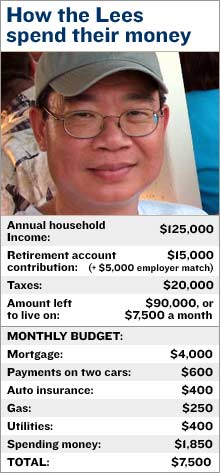 Not the Lees. To both give their two children a good education and continue saving for retirement, 13 years ago the Lee's downsized from a new 3,200 square foot, 5-bedroom colonial to a 30-year-old, 2,200 square foot four bedroom home.
Not the Lees. To both give their two children a good education and continue saving for retirement, 13 years ago the Lee's downsized from a new 3,200 square foot, 5-bedroom colonial to a 30-year-old, 2,200 square foot four bedroom home.
48-year old Han-Lin Lee and his wife managed two kids, a house and $500,000 in the bank on $125,000 a year.
The smaller house was in a better school district and thus avoided the need to send the kids to expensive private schools. Instead they plowed that money into their 401(k)s.
Now, despite the costs of raising two children and a comfortable-but-not-excessive annual household income of $125,000, they sit on half a million dollars in savings. And that doesn't even count the $500,000 they have in home equity.
"It doesn't take a rocket scientist to figure out that a 401(k) is a pretty good deal," said 48-year old Han-Lin Lee.
Han-Lin and his wife, Fu-Lin, met at graduate school in Illinois. They both had come over from Taiwan and had won scholarships to study -- she educational psychology, he civil engineering.
At the age of 30, soon after Han-Lin got his first job out of school with an environmental consulting firm, the couple bought a town house for $97,000.
Although Han-Lin was making only $35,000 a year, he contributed 10-12 percent to his 401(k), which also had a company match of 4 percent. Before long, and with regular raises, he was socking away nearly $14,000 a year.
The couple had their first child, a boy, in 1988. A year later they sold the town house and bought the big colonial for $242,000. By this time Han-Lin said he was making more money, and with Fu-Lin's paid internship they were bringing in $60,000 a year.
In 1992 Fu-Lin got a job as a counselor at George Mason University. The Lees also had another child by then, a 2-year-old girl.
"I looked around and figured I probably needed to downsize just to get to a better school district," said Han-Lin.
So they traded the big colonial in Lanham, Md. for a smaller house in the nicer neighborhood of McLean, Va. But the housing slump of the early 90s took its toll and they had to rent out the colonial until they finally sold it 1996 for $200,000, a loss of over $40,000.
Nonetheless, the Lees persisted with their 401(k) contributions, maxing them out each year and getting the full employer match.
In 2004, with the housing market hot, they finally decided to trade up. They sold the 2200 square foot house for $680,000, more than twice what they paid for it, and bought a 4,000 square foot, six bedroom home for nearly $1 million also in McLean.
Now they juggle a mortgage, for which they pay a hefty $4,000 a month. Fu-Lin has her own psychology practice so it's just Han-Lin contributing $15,000 a year to his retirement plan, which changed to a Thrift Savings Plan with a $5,000 match when he took a job as a Department of Energy analyst.
And their kids, now age 15 and 18, are looking at college.
Although the Lees never set up a separate college savings plan, they aren't worried.
Han-Lin said he was more comfortable saving his money in retirement accounts or in real estate than using a separate college savings account.
He said they will pay for college through a variety of means, including scholarships, loans, raises at work and part time jobs for the kids.
"I'm kind of still playing it by ear right now, keeping my options open," he said.
He also pointed to Virginia's well-regarded public universities and said his kids might go to one of them, helping to keep the costs down.
Over the next ten years, through a combination of continued 401(k) investment, paying off the house and stock market appreciation Han-Lin expects to double the family's assets to over $2 million.
And after that?
"I'm going to travel to a lot of places but not spend a lot of money," he said.
Charles - 2006-02-23, 12:03
发表主题: Millionaire in the making 如何成就百万富翁!
To millionaire status...and beyond
Paul and Audrey Yazbeck are taking control of their money and they're having fun doing it.
NEW YORK - Before you become convinced America's youth is woefully unprepared for financial reality, meet Paul and Audrey Yazbeck.
 Paul, 25, and Audrey, 24, have already socked away more than $125,000. Audrey is an accountant, and Paul, who attended college on an Army scholarship, currently is serving as an Army officer.
Paul, 25, and Audrey, 24, have already socked away more than $125,000. Audrey is an accountant, and Paul, who attended college on an Army scholarship, currently is serving as an Army officer.
At the rate they're saving, the Yazbecks will be millionaires well before retirement. But they're setting their sights beyond the millionaire mark.
"Our main goal is financial freedom. It's all about keeping our options open," Paul said.
While taxable accounts, Roth IRAs and 401(k)s may be hobgoblin to most twenty-somethings, the Yazbecks know the ins and outs of each of these financial planning products.
Early bird gets the worm
They also understand the importance of saving early. "Each positive money move we make now compounds into more positive results for the future," Audrey said.
The couple intends to have children down the road, and they'd like to have the option of having one parent stay at home in the future.
They saved $50,000, or about Paul's entire paycheck, last year and are setting a similar target for 2006.
Besides shaving everyday costs by brewing coffee at home and bringing their lunch to work, they also act on every saving opportunity.
 Take the mortgage on the town home they bought in Georgetown, Texas, which is about 20 miles north of Austin.
Take the mortgage on the town home they bought in Georgetown, Texas, which is about 20 miles north of Austin.
Originally they had a 30-year fixed mortgage, but refinanced when a three-year adjustable-rate mortgage at a lower rate became available.
Adjustable-rate mortgages can be riskier than fixed-rate ones because rates can increase over the lifetime of the loan. But since the couple plans on selling the house within the next three years, the refinancing seemed like a smart choice, they said. They expect the refinancing to save them about $2,500.
Budget for success
Each month the Yazbecks -- who make about $115,000 a year, or $9,600 a month before taxes -- carefully budget their expenses and track their spending.
They earmark about a third of their income for investing, and most of these dollars go to maxing out their 401(k) plans and making regular contributions to their Roth IRAs. About 90 percent of their savings are invested in stocks and mutual funds, but they're also considering diversifying away from equities.
While the Yazbecks are meticulous about their budget, they don't let it rule their life. "We're not bound by it, but use it to guide and track our goals," Audrey said.
Money can be a sore point for many couples, but the Yazbecks avoid conflict by working together on their financial roadmap.
Paul has found such satisfaction in planning that he is considering becoming a certified financial planner when he's eligible to leave the Army. "The future looks really bright," he says.
想当理财高手 - 2006-06-27, 23:10
发表主题: Millionaire in the making 如何成就百万富翁!
Millionaire in the making
Civil servant and reservist Megan Murray is marching towards a secure retirement.
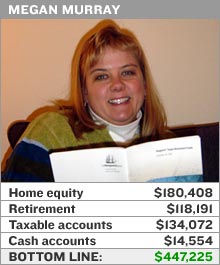 Houston,TX - Is it possible to get rich in the army? Megan Murray thinks so.
Houston,TX - Is it possible to get rich in the army? Megan Murray thinks so.
Murray, 38, joined the military on an ROTC scholarship at Northern Illinois University. She became an officer after graduation and spent three years in active duty before transferring to the reserves.
Financially, Megan is in good shape, with a net worth totaling $447,225. It isn't just the paycheck that got her there -- a keen interest in personal finance played a big role.
A near 17-year veteran, Megan intends to stay, at the very least, another six years in order to qualify for a military retirement. (Service personnel need 20 years of service, but Megan spent three years on inactive status training for her civilian career, in civil aviation security.)
Two years ago, Megan was called up for active duty. She's bringing home nearly $68,000 annually during the deployment, plus an estimated $2,600 each month from her non-taxable food and housing per diem.
The math works out to be about $16,000 less than the $115,000 she makes when working and doing reserves part-time, but she doesn't seem to mind.
"I intend to go as long as possible," she said. "We don't make huge salaries in terms of what can be made in America. But our work is so important that I want to make my life out of it."
Assets in reserve
Megan's military pension is based on the number of years she spends in the reserves and the number of points she earns doing active duty. Assuming she's never deployed again, her monthly retirement payout would equal some $1,800 in today's dollars by the time she is 60.
That pension isn't her only means of retirement income, either. Megan maximizes her contributions to a thrift savings plan, or TSP, which she defines as the federal equivalent to a 401(k).
"There are three parts to our retirement savings program: TSP, Social Security, and the pension," she explains. "The TSP has the biggest potential."
Megan qualifies for two different TSP plans because she is a federal employee and reservist. She receives a 5 percent match from her civilian plan -- the army plan doesn't have a match -- but she can't make contributions to her civilian plan while deployed.
She also stashes the maximum allowed in her Roth IRA, bringing her total retirement savings to $118,191. The core of her portfolios is invested in mutual funds, mostly Vanguard.
Megan has a separate stock account, worth $14,554, but plans on moving her money into a fund. "With the amount of time it takes me to research it, it's better for me to invest in mutual funds," she says.
She links all her accounts through Vanguard so that she can track them and review her allocations each month. She earmarks her mid-month paycheck for investing and has it automatically deducted from her checking account.
Her next move may be in real estate. Her Las Vegas-area home has appreciated considerably in the past couple of years, but she is looking at different prospects across the country.
Megan owes about $119,590 on her 15-year mortgage, but with a 5.25 percent interest rate she sees no need to pay it off early.
Drilling it home
Megan has no debt outside her mortgage and never carries a balance on her Discover card. Student loans aren't a problem either, as the army is also picking up the tab for her MBA at the University of Illinois at Chicago, where she is studying part-time.
When she leaves the army Megan wants to be a financial adviser or counselor, in part because of all the fun she's had managing her own money.
"People should have as much fun with their investments -- shopping for investments -- as shopping at the mall," Megan stated.
It's a habit that builds net worth. That's one of the reasons why the sale-only shopper frequents Wal-Mart and Kohl's rather than higher-priced boutiques.
One of her savvier purchases was a 2003 Honda hybrid that allowed her to take a $2,000 tax deduction the year she bought it. She doesn't budget for gas anymore, although it will take her a couple of years to recoup the difference between the higher sticker price and gas savings.
Megan also takes full advantage of many of the discounts military life has to offer, such as free dental and medical care as well as discounted insurance through USAA.
Holding onto her earnings is her No. 1 priority, but stresses that investing early is just as important.
"Make wise decisions now, and it will pay off," she said. Good lesson.
想当理财高手 - 2006-08-21, 22:32
发表主题: Millionaire in the making 如何成就百万富翁!
Millionaire in the making
Good habits are hard to break
With a baby on the way, Natalie and Greg Turner put saving first...and Pearl Jam second.
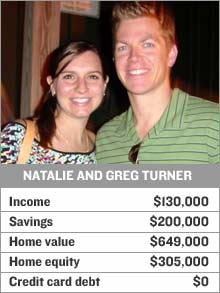 Fort Worth, TX. Some people get a thrill out of spending -- the Turners are excited to save.
Fort Worth, TX. Some people get a thrill out of spending -- the Turners are excited to save.
Natalie, 27, and Greg, 28, first met at Clemson University in South Carolina six years ago, they fell in love and moved to Charleston shortly after graduation. They bought a home together, then got married and are now expecting their first child.
Life is sweet for the young couple but they've worked hard to make it that way.
Greg, a pharmaceutical salesman, and Natalie, a software engineer, make a combined annual income of $130,000. Even though their net income affords them a comfortable lifestyle they have made saving their first priority.
"My husband, Greg, and I make it a game to see how much money we can stash away in savings and mutual funds," Natalie said.
"He invests 19 percent of his paycheck, while I put 15 percent into retirement, but we also put aside about $12,000 a year into mutual funds and always have at least a year of living expenses saved up just in case of an emergency."
So how do they manage to sock so much away?
The couple are modest spenders, Greg uses a company car so they only own one car between the two of them which has been paid off for a few years. They do most of their shopping at Costco and Natalie admits she has even curbed her clothing expenditures thanks to Greg's influence.
They recently splurged on new baby furniture for the nursery but Natalie and Greg never put more on their credit cards then they can pay off at the end of the month.
And they still allow for at least one nice vacation a year and one other indulgence -- Pearl Jam. They make time for concerts whenever and wherever they can.
Next up the couple is heading to Cabo San Lucas for a romantic getaway before baby makes three. Natalie says they will use hotel points and frequent flier miles that they have earned from frequent business trips.
Any extra income, including bonuses and monetary gifts from family, goes directly into an investment or savings account, and they plan to start a 529 college savings plan with the money they expect to receive from their families after the birth of their child.
The only exception has been their tax refund -- which they've spent on new floors, new countertops and other upgrades to their home, which they recently sold for $480,000 -- more than twice what they bought it for three years ago
They used the money from the sale as a downpayment on a four bedroom in the same neighborhood. Natalie says they didn't intend to turn their house over so quickly but with a baby on the way, "it was a good time to upgrade."
But even with a new house and new baby, don't expect the Turners to slack off on saving.
"It's great to be able to live and enjoy life, knowing that 30 years from now, we will be able to enjoy it even more!"
Charles - 2006-09-23, 09:03
发表主题: Millionaire in the making 如何成就百万富翁!
Millionaires in the Making: The Marchbanks
Matt and Lori have managed to build $300,000 together just a few years out of college, and not by cutting back on life's pleasures.
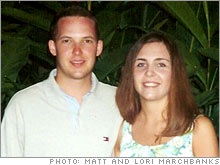 Dallas, Texas -- If the idea of saving away 25 percent of your paycheck makes you think of a severely cramped lifestyle, meet the Marchbanks of Dallas, Texas.
Dallas, Texas -- If the idea of saving away 25 percent of your paycheck makes you think of a severely cramped lifestyle, meet the Marchbanks of Dallas, Texas.
Matt, who works on real estate and small business lending at a commercial bank, and Lori, an accountant, have a shared financial philosophy that lets them spend confidently - and save diligently.
The couple met in high school and dated throughout college at Texas A&M, marrying two weeks after their 2000 graduation. Now, at the ages of 28 and 27, Matt and Lori have over $300,000 in assets.
"We were both fortunate to get great jobs out of school," says Matt. "Our parents paid for college so we didn't start with any debt."
How they save
The Marchbanks take home a combined salary of $145,000, plus annual bonuses of around $40,000. But a good salary doesn't always mean good savings. With mortgage payments on a beautiful 2000-sq.-foot home, and a confessed preference for nice cars, how does the couple save as much as they do?
"We share a philosophy: we can afford a lot more, but we choose to pay ourselves first," he says. "When we're 55, we want to be the ones to decide if we continue working, or take part-time jobs or just travel. Nothing beats saving when you're young so you can get ahead with the power of compound interest."
Accordingly, Matt and Lori set aside just over 25 percent of their income each month. They both max out their 401(k)s at work, taking advantage of company matches. Each year they have put the maximum possible into their Roth IRAs before hitting the government's income limit last year.
Beyond that, they don't really operate with a strict budget - more like strict values.
They pay off credit cards every month, so their only debt is their mortgage, and Matt says interest rates are a major concern of theirs.
He says he learned his good financial habits from his father, an insurance salesman, and mother, a school teacher.
The couple has over $100,000 in their combined 401(k)s, and $50,000 in Roth IRAs. They have around $100,000 in cash in savings accounts, and $40,000 in home equity.
Matt says the large cash holding is eventually going to be invested - he'd prefer to have only 25 percent in cash as an emergency fund. But he's currently interviewing different investment advisers before putting the bulk of the cash into the market.
How they spend
One of Matt's big indulgences is his golf game, but he often gets to play while entertaining bank clients.
Matt also views negotiating prices as a crucial skill in his financial repertoire. "I almost never take the first price on anything, whether it's haggling or asking for discounts," he says. "I do a lot of negotiating in my job, so I'm more comfortable with it than many people. I'll never pay sticker price for a car, for instance, because to me there's always wiggle room."
Cars are one purchase that Matt feels especially strong about.
"I drive about 25,000 miles a year so I want to drive something I like," he says. "We definitely splurge a little there."
In purchasing Lori's car, one of the couple's biggest expenditures, he negotiated a price below the invoice and a very low interest rate.
Her '05 Acura TL is the only car the couple has bought new. Matt drives a used vehicle - an '03 Infiniti G35 that he bought with low mileage.
The future
What's ahead for the penny-conscious couple? A child, and perhaps a new home.
"We'd like for Lori to stay home for quite a while after the first child, and maybe not go back to work full-time," he says. He says that there is a lot of flexible work in her field, accounting, and that will give the couple more options after they have children.
"I don't expect to be able to save as much after that - maybe just 10 to 15 percent - but that will be fine," he says.
Matt says a new home may be in the works if their current place begins to feel small for a family of three.
"We're definitely thinking about upgrading in the next two to three years, but it all depends on whether interest rates are favorable," he says. "I've got a 5.25 percent rate for 30 years right now."
He'd also like to add some real estate to the family's portfolio, purchasing some land or rentals.
Despite some major financial burdens ahead, don't expect the Marchbanks to give up their saving ways.
"We're really not penny-pinchers," says Matt. "I think we just really think over our financial decisions. We have a strong common focus that moves us toward our goal."
想当理财高手 - 2006-10-16, 23:35
发表主题: Millionaire in the making 如何成就百万富翁!
Millionaires in the Making: The Johnsons
Matt says he's squandered his money on cars and even a tattoo. But with wife Kristina's discipline, the couple is on their way to financial security.
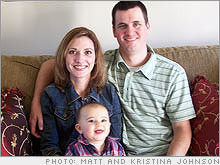 Portland -- Matt Johnson can remember a time when he was barely in control of his money, let alone in command of it.
Portland -- Matt Johnson can remember a time when he was barely in control of his money, let alone in command of it.
"At one point in college I spent my last $80 on a tattoo," Matt said. "It just seemed like a great thing to buy at the time."
Matt Johnson was in the habit of buying a brand new car every two years before he met wife Kristina.
He was also in the habit of buying a brand new car every two years, going through four cars between 1997 and 2003.
"But Kristina has really helped me change because she approaches money in such an organized way," he said.
Matt met future wife Kristina in their sophomore year at Maryland's Villa Julie College, and they got engaged soon after graduation in 1998. Kristina was an accounting major, and applied some fiscal discipline to Matt's previously free-spending ways.
Now married, Kristina takes care of all the budgeting and bills, and Matt handles the investing.
"We rein each other in," said Matt. "I have a thing for cars, and she has a weakness for shoes and clothes. But we do a good job of keeping each other grounded."
"I don't think we've ever had a serious argument about money," he said. "Well, maybe once we had to have a talk about cars."
The couple has also managed to stash away $200,000 and built up over $120,000 in home equity - and they're both just 30 years old.
How they save
It doesn't hurt that Matt and Kristina take home a combined $147,000 a year - but that alone doesn't keep their finances in good shape.
"We're big believers in doing paycheck deductions - don't even let that savings money into your bank account," said Matt. "It's the whole idea of not even seeing the money."
They both began contributing to their 401(k)s as soon as they began working. Matt became well-acquainted with the culture of saving while working in the 401(k) division at T. Rowe Price as a communications consultant. And Kristina built her budgeting skills while working as an accountant, spending five years doing auditing work for Bank of America.
Currently, Matt puts 10 percent of his income towards his 401(k) - with a plan of increasing his contribution one percentage point each year - and Kristina contributes five percent at her current job at Bay National Bank.
They're still trying to figure out how to invest $65,000 that they have in cash. Some of it they are slating for home improvements on their new home in Parkton, north of Baltimore, and some will go towards a diversified investment portfolio.
And they've kept their regular expenses to a minimum, starting off their marriage living in an affordable apartment while looking for a townhouse. Rather than renew the lease, the couple moved in with Kristina's parents for several months while they continued the home search. ("We probably wouldn't repeat that decision," said an older and wiser Matt.)
He describes Kristina as a "total coupon freak," and says the couple save 15 to 20 percent off their grocery bills most weeks.
With the birth of Nicholas earlier this year, the couple put $1,000 into a 529 college savings, and decided to allot one percent of Matt's paycheck this year, with a plan to increase that amount each year.
Both of their jobs offer annual bonuses, but the couple are putting those toward paying off their mortgage.
How they spend
Kristina says the adjustment between Matt's formerly free-spending ways and her budget-balancing accountant side wasn't as hard as it might seem.
"We didn't live together before we got married, so we definitely went through an adjustment period," said Kristina. "But we agreed when we got married that we didn't want to live life extravagantly, although we do enjoy traveling and going out to dinner with friends sometimes."
When the couple jumped and bought a townhouse near Baltimore in 2000, they made sure they weren't maxing out their budget.
"We paid $156,000 for the house - which felt like a lot of money at the time - but then we sold it in 2005 for $308,000," said Matt. "It's the best investment we didn't know we were making."
They found their new house one year ago, while Kristina was several months pregnant. They were just casually looking for homes, sending pictures back and forth online, waiting for the right combination of house, neighborhood and school system.
When Matt found it, the couple made the biggest long-term investment of their life, putting $50,000 down on it and took out a mortgage for $500,000.
They are currently paying about $3200 a month, but are hoping to pay the mortgage down as quickly as possible by steps like applying their bonuses to it.
"Had we not been as fiscally conservative over the years, there's no way we would've been able to do this," said Matt. "We did sell high, but we also had to buy high."
The couple also kept credit card expenditures to a minimum, while not forsaking plastic completely. "We've never paid a finance fee on a credit card," said Kristina.
They do put cards to work for them, however. "We use a Marriott credit card, and we haven't paid for a hotel room in five years," said Matt. "We're going to Las Vegas in early November, and we're doing it on my flight points and her hotel points."
And to satisfy their travel itch, they've vacationed in Italy, Hawaii, Mexico and England.
Matt's car habit has been happily curtailed, and he professes happiness at driving (and frequently sharing) a 2003 Toyota Highlander that they bought new. And Kristina drives a '98 Acura Integra. The cars are completely paid off.
When Kristina returned to work after giving birth to Nicholas, the couple also confronted the reality of day-care payments, to the tune of $1,000 a month.
"It's definitely worth the flexibility, but it does hurt the pocketbook," said Matt. "But the provider is top-notch and we knew if we were going to spend the money, we were going to do it right."
The future
The future is full of options for the couple, and that's just the way they've planned it.
Both of them want to keep indulging their passion for travel, and Kristina is thinking about opening her own business some day.
"I used to dance ballet, and someday I'd love to open my own dance studio," she said.
With all the details of their financial life, it's baby Nicholas that's taking their attention now. "Having the baby around, you definitely refocus what you spend money on, and how you want to spend your life," said Kristina. "We're thinking about money, but also about finding time for Matt and I to just hang out."
想当理财高手 - 2007-01-08, 23:30
发表主题: Millionaire in the making 如何成就百万富翁!
The Aroras: Millionaires in the Making
Sid and Divya took their honeymoon nine months late to make sure it didn't dent their budget...one sign they have their priorities in order.
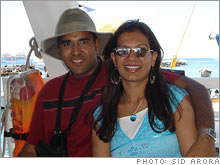
Houston,TX -- Sid and Divya Arora recently returned from a beautiful honeymoon in Hawaii, taking a leisurely cruise through the islands. Only thing is, they waited nine months after they got married to take the trip.
"When we got married, our priority was buying a home," says Divya. "So we just decided we'd put off the honeymoon for a while."
Shared discipline on finances - and a little bit of delayed gratification - have gone a long way for the Aroras, based in West Chester, Pennsylvania, who have saved over $200,000 in assets as they reach their late 20s.
How they save
Sid, 28, moved to the United States when he was 17 and says money was something he kept a close eye on.
"I come from a middle-class background in India where money was a big concern," he says. "In India, it was more about saving money to make sure you could cover your basic utility bills."
He attended the University of Michigan, majoring in computer science. His parents had just moved to Ann Arbor, Michigan and they found that Sid qualified for a big chunk financial aid. So his school loans totaled only about $5,000.
Sid began his career as a software programmer at Intel five years ago, and immediately started contributing to his 401(k). His family had seen their investments plummet during March 2000's dot-com bust, so he was careful to invest his savings in a variety of diversified funds.
Before he met Divya, he used money he had earned at Intel to purchase a home in Arizona, which he would sell three years later for a $130,000 profit.
"I thought about holding onto it as a rental home, but I wanted to sell it at the top of the market," he says.
He met Divya in Punjab, India two years ago and the two hit it off and got engaged. They married in November 2005 in New Jersey, and moved to Pennsylvania to look for a home soon after. He took a job with a technology consulting firm doing programming. Now in his second year with the company, he will soon be eligible for 401(k) matching.
Divya had completed five years of education to become a dentist in India, and worked for a year at a dentistry practice there, but found out that she'd need to take two more years of school in the United States to practice.
So the two knew it would be some time before they'd be able to live with the luxury of two incomes in their household. Until 2009, when Divya begins working full-time as a dentist, the couple will live off of Sid's salary.
Their current priority is their mortgage on their new home and setting aside $800 to $1,000 a month for savings. Sid automatically deducts $500 each month from his paycheck that goes straight to a savings account.
Sid is aiming to make two extra of his biweekly mortgage payments each year, part of the reason the couple have already built up $50,000 in equity in their home after less than a year. The payments total $1,700 a month, and the couple have about $200,000 left on their mortgage. He aims to have the 30-year fixed-rate mortgage paid off in 24 years.
"Every month we plan out our spending, and base our savings around that," says Divya. "We usually save more than $500, and never less than that."
How they spend
On the spending side, the two pride themselves on moderation and long-term thinking. That moderation starts with some very simple things: eating home lunches, not smoking and not drinking.
Sid and Divya believe that small expenses that build up can undermine a budget. They also look out for basics like paying all their bills on time, and using low-interest credit cards.
And their monthly planning session gives them some good perspective about big upcoming expenses ahead. They catalogue all of their upcoming expenses for the month, and use this planning session to determine their savings rate as well.
One expense that the couple is putting on credit is their honeymoon trip to Honolulu, a splurge for which they dropped $5,000 on the flight and cruise.
Other than the debt from the Hawaii trip, the couple has no other credit-card debt.
Another big purchase was Sid's Acura RSX, which he bought new in Arizona in his first year at Intel.
The biggest expense ahead for the couple is Divya's dental school education. In order to become certified to practice in the United States, she needs two years more school (which will bring her dentistry education to a lengthy seven years.) This will cost the couple $120,000, and they won't be able to make a big dent in that until she begins work in several years.
Because it will be difficult for Divya to work while completing her degree, the couple plan to pay off the low-interest student loans after she graduates and begins working full-time.
The future
The couple have big plans ahead, and not just the European vacation they're arranging.
They're planning to continue making extra mortgage payments in order to pay their home off after just 20 years.
Divya plans to complete her dental degree and eventually specialize in endodontics, the treatment of root canals.
Their biggest plans are for middle age, however. Sid would like to be able to leave full-time work, and spend the bulk of his time traveling and being with his family. Divya isn't quite ready to drop out so early after her long education - she says she'll practice dentristy for 25 to 30 years before thinking about working part-time.
As for now, the couple is taking it day to day, they say. But with their constant attention and dedication to the future, their millionaire dreams can't be too far away.
想当理财高手 - 2007-02-28, 20:01
发表主题: Millionaire in the making 如何成就百万富翁!
Millionaire in the making: Daren Fike
38-year old widower's good financial sense positions him well for the future
.
NEW YORK -- Daren Fike, a business analyst in Colorado Springs, Colo., had always been a saver and a planner.
When his wife Christie passed away suddenly from leukemia in 2003, however, Daren's goals shifted and spending time with his daughter Melody, who was 16 months old at the time, became a priority.

Daren Fike, 38, with daughter Melody, 4, at home with the notebooks.
The father and daughter live 40 miles from Denver, in Colorado Springs, in a house surrounded by 5 acres of land. They have a horse, Cricket, that Daren is just beginning to teach Melody to ride.
"My wife was big into horses," said Fike. "She showed them [competitively]."
They bought their home in 1998 for $199,000 with a 30-year, 7 percent fixed mortgage. In 2003, Fike refinanced to a 15-year, 5.125 percent fixed mortgage.
Fike makes payments on a bi-weekly basis and today owes $124,000 on his home. Fike thinks he can have it paid off by 2012.
Fike's annual income, with death benefits from his wife's previous employer as well as Social Security survivor benefits, hovers around $100,000.
Fike contributes 12 percent of his salary to his 401(k) plan.
His employer, Great Western, contributes another 4 percent in a company match. Fike is fully funding his Roth IRA at $4,000 a year, which has $42,000. He puts $3,000 per year into his taxable Fidelity Brokerage account, which totals $84,000.
Additionally, he has more than $98,000 in two 401(k) accounts - the second one holding funds from a rollover. Fike also has almost $32,000 in mutual funds and $34,000 in an annuity.
All told, Fike has about $290,000 socked away for retirement. He also has $24,000 in an emergency fund earning 5 percent interest with online bank Emigrant Direct.
"In one of my accounts somewhere I have the first dollar I was ever given. It was a dollar I received when I was first born," said Fike, who credits his parents for emphasizing how important saving is.
It's not just Fike's prudent choices but his lifelong saving habits that aid him.
The Notebooks
For years Daren has kept track of his every expenditure in little notebooks. Every 15 days, which coincide with his pay, he totals the amounts. At that time, anything left over in his checking account goes immediately into his savings. The idea is to never have any money left in his checking account at the end of the 15 day period.
When he was in the Air Force, he says, his friends called it the "Fike Strategy."
Fike said he tried to use personal finance software like Quicken but found it too time consuming. "But spending $1.50 every 2 or 3 years for a notebook? It's portable, too."
The simplicity of Daren's financial philosophy extends to his choice in credit cards, too.
Fike has used a Discover Card since he was in college. "I've never paid one penny in interest on the card. When I put everything on that card, I'm getting about $300 back."
Having a 40 mile commute and knowing that gas would be a consistent expense, Fike switched to the type of Discover card that gives 5 percent back on gas.
Fike looks to shave costs off in other areas, too. He makes certain his car isn't carrying any extra weight in its trunk to save gas.
His 1997 Cougar has 185,000 miles on it and he says, "I'm not looking forward to getting rid of it anytime soon. I'll drive it till the wheels fall off."
In addition to the Cougar, which he drives daily, he owns a 2000 Chevy Silverado truck.
Values and plans
"The thing I value most in life is time with my daughter," said Fike. "I would gladly give every cent I have to spend just five more minutes with my late wife Christie so you can be sure I'm not taking the time I have with Melody for granted."
In addition to time spent teaching Melody to ride a horse, Melody takes ice skating and swimming lessons. Fike, a Pittsburgh-native, follows all the Steel City's sports teams closely, too.
By no means is Fike a passive observer of the world. "Since my wife's passing, my emphasis has been on having more life experiences," Fike said.
These days Daren and Melody do a lot of father-daughter activities together such as visiting the park or going bowling.
Last year, they went back to Pittsburgh in June and attended the Steelers Men's Fantasy Camp in Latrobe, Pennsylvania, meeting running-back Jerome Bettis of the Superbowl-winning team.
Daren has also taken up television writing as a hobby. He and a friend are shopping a script around for a dramatic TV show.
Regarding money, Fike says it's "almost like a necessary evil. You have to pay attention to it. The earlier you pay attention to it, the better off you're going to be."
That's why he's teaching Melody about money. "She saves up the money she gets from birthdays and holidays in her piggy bank," he said. "We go together to the bank so she can make her own deposits. She already knows what 'interest' is!"
想当理财高手 - 2007-09-13, 16:57
发表主题: Millionaire in the making 如何成就百万富翁!
Millionaire in the making: Jerry and Lynn Moser
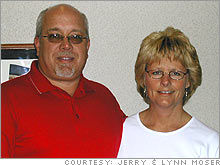
Age: Jerry 47, Lynn 46
Occupation: Regional sales manager and secretary
Salary: $106,000 combined
Investment accounts: $225K
Checking: $3,000
Home equity: $90,000
Achieving financial security, let alone becoming a millionaire, was a distant dream for Jerry and Lynn Moser 14 years ago. At the time, the yet-to-be married South Dakota couple had battered credit ratings and virtually no savings. Lynn was working two jobs trying to pay down a high credit card balance, while Jerry, recovering from a drug and alcohol addiction, was earning just $6 an hour working in an appliance store warehouse.
Recognizing how dire their financial situation was, the couple, neither of whom earned college degrees, began studying up on money management, learning the fundamentals of personal finance. While Lynn juggled her job and two daughters (now 20 and 16), Jerry logged 60- and 70-hour weeks, working his way up to his current regional sales manager position.
Now the Mosers boast a combined salary of $106,000 and a combined net worth of over $300,000, and they say that their credit rating is in tip-top shape. “We went from disaster to success in a relatively short time,” says Jerry.
What’s their saving secret? Nothing fancy, explains Jerry. The couple contributes 15 percent of their pre-tax income into their respective 401(k) accounts and $2,000 each into their Roth IRAs every year. They carry very little outstanding debt (other than the mortgage on their home), rely on coupons and research long and hard before making any big-ticket buys.
The Mosers are confident they will reach millionaire status by the time they reach their mid-sixties. “The process is in motion,” said Jerry. “All we need is time for our money to compound.”
That goal is well within the Mosers’ reach, and that’s not even including the equity in their home, says Lisa Kirchenbauer, a certified financial planner and president of the Arlington, Virginia-based Kirchenbauer Financial Management & Consulting.
In fact, Kirchenbauer recommends they could even scale back some of the aggressiveness in their portfolio - which has large doses of international stocks as well as energy and real estate funds. A more diversified portfolio would better position them to weather a downturn.
In addition, says Kirchenbauer, they should set a more ambitious goal . “I think to be able to have the comfortable retirement and especially to provide some inheritance, they will need to shoot for something more like $2 million,” says Kirchenbauer.
To do that she recommends that the Mosers increase their retirement account contributions closer to the Federal max - $15,500 for 401(k) and $4,000 each for their individual Roth IRAs. Living in a relatively inexpensive part of the country and with their children almost grown, they have a lot of time to earn and save even more, says Kirchenbauer.
She also notes that the couple should also build up their cash reserves for an emergency fund. In addition, they should ensure that they have a reasonable amount of life insurance and a strategy to cover their health care expenses during retirement.
 NEW YORK - Dave and Annie Hall have priorities: They want to build up their retirement accounts and other investments, live comfortably, and become millionaires over the next 15 years.
NEW YORK - Dave and Annie Hall have priorities: They want to build up their retirement accounts and other investments, live comfortably, and become millionaires over the next 15 years. 

 NEW YORK - Dave and Annie Hall have priorities: They want to build up their retirement accounts and other investments, live comfortably, and become millionaires over the next 15 years.
NEW YORK - Dave and Annie Hall have priorities: They want to build up their retirement accounts and other investments, live comfortably, and become millionaires over the next 15 years.
 "In Mozambique, we had to go to a hotel, and she asked for a bucket of water to bathe," Dave remembers. "When the water went down the drain, several cockroaches came out of it. Now, we've bumped up what we spend on accommodations."
"In Mozambique, we had to go to a hotel, and she asked for a bucket of water to bathe," Dave remembers. "When the water went down the drain, several cockroaches came out of it. Now, we've bumped up what we spend on accommodations."
 NEW YORK - Ryan and Danielle Quilling are hoping to be the millionaires next door.
NEW YORK - Ryan and Danielle Quilling are hoping to be the millionaires next door.
 That hasn't keep people like Bo Apostolache, a 28-year-old mortgage banker in Orange County, out of the market.
That hasn't keep people like Bo Apostolache, a 28-year-old mortgage banker in Orange County, out of the market.
 Dallas - Contrary to what another North Carolinian wrote, you can go home again. At least Jim Elliott did.
Dallas - Contrary to what another North Carolinian wrote, you can go home again. At least Jim Elliott did.
 By the late 1990s, the Elliotts began looking to move back to North Carolina. A friend in the real estate business there pointed Elliott to a 2,500 square foot, four bedroom, 2-and-a-half bath, contemporary.
By the late 1990s, the Elliotts began looking to move back to North Carolina. A friend in the real estate business there pointed Elliott to a 2,500 square foot, four bedroom, 2-and-a-half bath, contemporary.
 In September of 2002, the Elliotts took their biggest real-estate step, a $425,000 purchase of the Culpepper Inn, a 12-bedroom, 13-bath, brick colonial, bed and breakfast. They now live in several of the rooms and run the rest as an inn.
In September of 2002, the Elliotts took their biggest real-estate step, a $425,000 purchase of the Culpepper Inn, a 12-bedroom, 13-bath, brick colonial, bed and breakfast. They now live in several of the rooms and run the rest as an inn.
 Dallas - Mark and Lori Gorney are well on their way to the millionaire's club, and they're not real estate flippers or lottery winners.
Dallas - Mark and Lori Gorney are well on their way to the millionaire's club, and they're not real estate flippers or lottery winners.
 Florida - At some point either during or shortly after getting an undergraduate degree, many people ask the grad school question. Do I continue to pursue my academic dreams or enter the world of work?
Florida - At some point either during or shortly after getting an undergraduate degree, many people ask the grad school question. Do I continue to pursue my academic dreams or enter the world of work?
 L.A. - For all of you who'd like to see a "Millionaire in the Making" about someone who isn't either flipping real estate or pulling down six figures a year, meet Hai Tieu.
L.A. - For all of you who'd like to see a "Millionaire in the Making" about someone who isn't either flipping real estate or pulling down six figures a year, meet Hai Tieu.
 NEW YORK - It's a simple savings philosophy, but Mike Rogalski hopes that discipline and "paying yourself first" will put him at millionaire status by the time he reaches his early 40s.
NEW YORK - It's a simple savings philosophy, but Mike Rogalski hopes that discipline and "paying yourself first" will put him at millionaire status by the time he reaches his early 40s.
 NEW YORK - They've traveled to Budapest and Prague and have one future college education paid for, but that has not deterred Mark and Kristi Johnson from shooting for millionaire status.
NEW YORK - They've traveled to Budapest and Prague and have one future college education paid for, but that has not deterred Mark and Kristi Johnson from shooting for millionaire status.
 Dallas,TX - Justin D'Angelo didn't want to go straight to a 9-to-5 lifestyle after college, so he needed to launch his own business. But he didn't have any idea what that business would look like.
Dallas,TX - Justin D'Angelo didn't want to go straight to a 9-to-5 lifestyle after college, so he needed to launch his own business. But he didn't have any idea what that business would look like.
 NEW YORK - At the end of the evening, when it's time to settle the check or close the bar tab and most people reach for the plastic, Christopher Ortega just says no.
NEW YORK - At the end of the evening, when it's time to settle the check or close the bar tab and most people reach for the plastic, Christopher Ortega just says no.
 Not the Lees. To both give their two children a good education and continue saving for retirement, 13 years ago the Lee's downsized from a new 3,200 square foot, 5-bedroom colonial to a 30-year-old, 2,200 square foot four bedroom home.
Not the Lees. To both give their two children a good education and continue saving for retirement, 13 years ago the Lee's downsized from a new 3,200 square foot, 5-bedroom colonial to a 30-year-old, 2,200 square foot four bedroom home.
 Paul, 25, and Audrey, 24, have already socked away more than $125,000. Audrey is an accountant, and Paul, who attended college on an Army scholarship, currently is serving as an Army officer.
Paul, 25, and Audrey, 24, have already socked away more than $125,000. Audrey is an accountant, and Paul, who attended college on an Army scholarship, currently is serving as an Army officer.
 Take the mortgage on the town home they bought in Georgetown, Texas, which is about 20 miles north of Austin.
Take the mortgage on the town home they bought in Georgetown, Texas, which is about 20 miles north of Austin.
 Houston,TX - Is it possible to get rich in the army? Megan Murray thinks so.
Houston,TX - Is it possible to get rich in the army? Megan Murray thinks so.
 Fort Worth, TX. Some people get a thrill out of spending -- the Turners are excited to save.
Fort Worth, TX. Some people get a thrill out of spending -- the Turners are excited to save.
 Dallas, Texas -- If the idea of saving away 25 percent of your paycheck makes you think of a severely cramped lifestyle, meet the Marchbanks of Dallas, Texas.
Dallas, Texas -- If the idea of saving away 25 percent of your paycheck makes you think of a severely cramped lifestyle, meet the Marchbanks of Dallas, Texas.
 Portland -- Matt Johnson can remember a time when he was barely in control of his money, let alone in command of it.
Portland -- Matt Johnson can remember a time when he was barely in control of his money, let alone in command of it.


